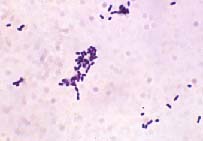
October 2002

A 60-year-old Italian-speaking woman with chronic lymphoblastic
leukemia presents with a 3-day history of fever, chills and hematochezia.
Initially she was seen in the oncology clinic, started on ciprofloxacin
and metronidazole and sent immediately to the emergency. She was
diagnosed with CLL 9 years ago and had received radiotherapy and
various chemotherapy agents. Most recently she received fludarabine
and cyclophosphamide one month ago.
On
examination she had a temperature of 39.4°C with a blood pressure
of 100/70 and heart rate of 120 bpm. The neurologic examination
was normal and she did not have signs of meningismus. There was
marked abdominal lymphadenopathy and prolapsed hemorrhoids that
were most likely the cause of the blood in her stool.
Her
routine blood work was normal. There was no growth from her urine
culture. However, gram-positive bacilli were seen in one out of
two blood culture bottles after one day of incubation. The bacteria
were described as small coccobacilli in short chains. (Figure
1)
The
patient was immediately switched to ampicillin 2g IV q4h and gentamicin
80mg IV q8h. She quickly improved and was stepped down to just
ampicillin for a total of two weeks. Upon further questioning,
it was revealed that in the week prior to her illness she ingested
unpasteurized goat cheese imported from Italy.

Figure 1: Gram Stain of Isolate reveals gram-positive
bacilli.

- 1. What is the bacterium found in her blood? What diseases
can this bacterium cause?
- Where is this bacterium normally found? How does it cause
disease in humans? Which populations are at most risk? What
advice would you give this patient upon discharge?
- Describe the mechanism of pathogenesis at the cellular and
molecular level.
- How would you confirm the identity of this organism?
- What antibiotics can be used against this bacterium? Which
common antibiotics have no activity against it?
Check out the Solution
for this Tech Teaser! |
|





